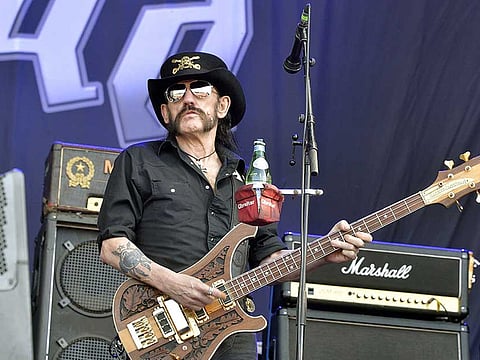Lemmy: Motorhead frontman lived rock’n’roll until the end
Motorhead singer and bassist, who died at the age of 70, was once Hendrix’s roadie

“You know I’m born to lose, and gambling’s for fools, but that’s the way I like it baby, I don’t wanna live forever.”
— From Motorhead’s 1984 hit song, Ace of Spades.
Ian “Lemmy” Kilmister, the hard-living, hell-raising frontman of British heavy metal band Motorhead, has died at age 70 after being diagnosed with an aggressive cancer on December 26, the band said on its Facebook page on Monday.
With his trademark moles framed by dark muttonchops, the bassist and vocalist cut an unmistakable figure on stage as he craned his neck to the microphone, growling out hits like Ace of Spades with a throat he said he fed for decades with a bottle of Jack Daniel’s whiskey a day.
“The thing about hangovers is, you have to stop to get one,” Lemmy liked to say.
"We cannot begin to express our shock and sadness, there aren’t words,” Motorhead said in its Facebook posting about Lemmy’s death. “We will say more in the coming days, but for now, please ... play Motorhead loud, play Hawkwind loud, play Lemmy’s music LOUD. Have a drink or few.
“Celebrate the LIFE this lovely, wonderful man celebrated so vibrantly himself. HE WOULD WANT EXACTLY THAT.”
A notorious amphetamine user, he once claimed to have stayed up for two weeks non-stop, but the hard living eventually took its toll and he struggled with his health in recent years.
In 2013, the band, canceled European summer festival appearances after he reportedly suffered a hematoma, and he told Rolling Stone magazine in 2014 he had seriously cut back on his drinking and smoking.
Lemmy lived rock music — he was a regular at Sunset Strip rocker hangout The Rainbow and never stopped recording and performing. And he wasn’t just culturally revered, he was critically acclaimed: Motorhead won a Grammy for 2004’s best metal performance.
HENDRIX’S ROADIE
Born in 1945, in Staffordshire, England, Lemmy’s father was a minister in the Royal Air Force and his mother a librarian. Starting in his teenage years, he had the good fortune to be present for many of rock ‘n’ roll’s pivotal moments. When he was 18, he went to see the Beatles at the Cavern Club in Liverpool.
After cutting his teeth in beat bands in the 1960s, he spent time as a roadie for Jimi Hendrix before his first taste of stardom with British space rockers Hawkwind, singing the band’s biggest hit, biker anthem Silver Machine, in 1972.
During his stint in the band, Lemmy’s pummeling bass lines became a stock-in-trade and provided the backbone of the ear-splitting Motorhead, which he formed in 1975 after being thrown out of Hawkwind following a drug bust in Canada.
After a bumpy start and lineup changes, the trio of Lemmy, guitarist “Fast” Eddie Clarke and drummer Phil “Philthy Animal” Taylor, tore through a string of albums that fed off the energy of punk rock and laid the foundations for thrash metal.
“I was fired out of every other band I was ever in, so I had to start my own group,” Kilmister told the Los Angeles Times in 2010. “They couldn’t fire me out of that.”
Between early 1979 and late 1980, Overkill, Bomber and Ace of Spades sent the band racing toward the upper reaches of the British album charts. In 1981, Motorhead finally hit No. 1 with its live classic, No Sleep ‘til Hammersmith.
Motorhead has released 22 studio albums with Kilmister as its only constant member, including this year’s Bad Magic, featuring typically aggressive songs like Shoot Out All of Your Lights and Teach Them How to Bleed.
Lemmy lived in Los Angeles, near the Sunset Strip, for decades and was controversial for his collection of Nazi memorabilia, although he denied sympathizing beyond fashion.
“I’ve always liked a good uniform, and throughout history, it’s always been the bad guy who dressed the best,” he told The Independent in 2010..
The band’s classic line-up broke up in 1982.
Former drummer Taylor died only last month, prompting a typically laconic response from his old bandmate.
“He was a real character, he was a real nutcase, and I do admire that in a person,” Lemmy said.
On Monday night, Kilmister was remembered online by his rock peers. “He was a warrior and a legend,” wrote Ozzy Osbourne, a fellow metal icon. “I will see you on the other side.”
The band Anthrax, one of countless groups influenced by the hard-charging Motorhead, added, “You are Rock N Roll.”
In her 2015 memoir Reckless, the Pretenders’ Chrissie Hynde wrote, “True to the ethos of rock, Lemmy was forever unchanging. It’s one of those inexplicable phenomena inherent to rock stars, the opposite of reinvention.
“Wherever he may be, he remains in a pub off St Luke’s Road, the actual location totally irrelevant. Not so much time travel, as untravel.”



